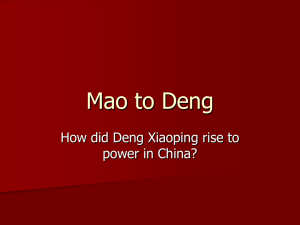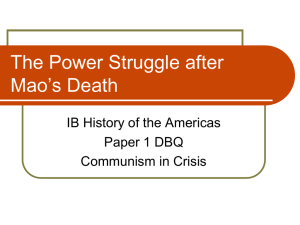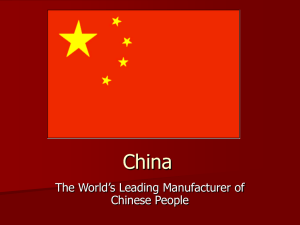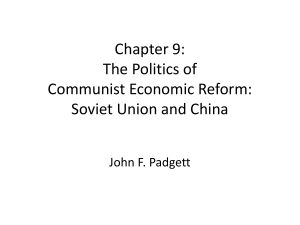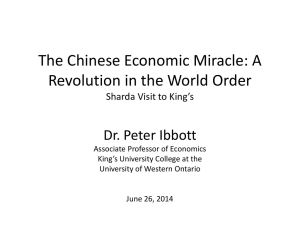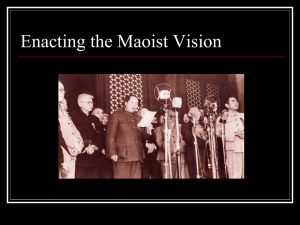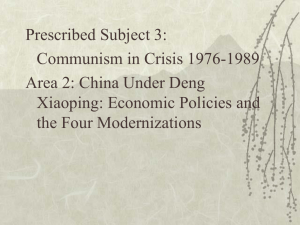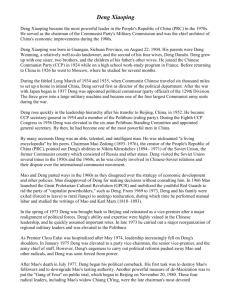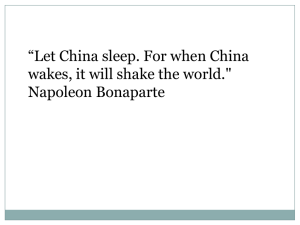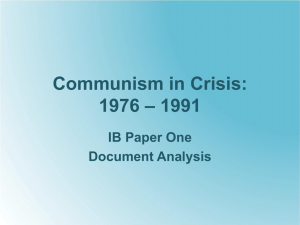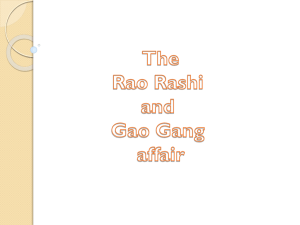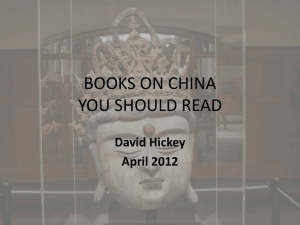Deng Xiaoping
advertisement
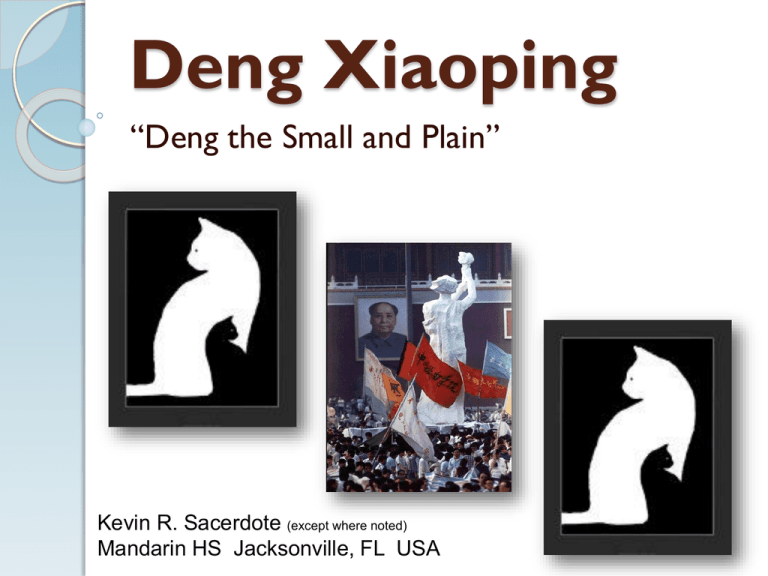
Deng Xiaoping “Deng the Small and Plain” Kevin R. Sacerdote (except where noted) Mandarin HS Jacksonville, FL USA Sources Deng: A Political Biography Benjamin Yang, M.E. Sharpe Publishers (1998) China and the Legacy of Deng Xiaoping Micheal E. Marti, Brassey’s, Inc. (2002) Whether a cat is black or white makes no difference. As long as it catches mice, it is a good cat Deng Xiaoping But he also backs Free Trade, Not Free People Deng Xiaoping Born: 1904 Died: 1997 (92) ◦ Barley 5’ Tall, 120 Lbs. ◦ Joined the Communist Revolution in the 1920’s ◦ Became the Dominant Leader of the Chinese Communist Party (CCP) He dismantled Maoism (Yang) 1976 The Year of the Dragon January 8th Zhou Enlai Died ◦ Deng was chosen to give the funeral eulogy ◦ Mao did not attend Physical and Political Reasons Sent Pine Wreath: “In Memory of Comrade Zhou Enlai” Mao reduces the role of Deng (semi-purge) Angry at comments about the Cultural Revolution Mao promotes Hua Guofeng (Yang, pp. 189-213) 1976 The Year of the Dragon April 7th Politburo announces two directives of Mao ◦ Removal of Deng from all leadership (in and out of the CCP) ◦ BUT: Deng lost his leadership, not his party membership ◦ Why is Mao lenient? ◦ Appoints Hua Guofeng as Premier, Mao’s heir apparent (Yang, pp. 189-213) 1976 The Year of the Dragon September Hua Guofeng heads the Politburo The Gang of Four Attempt to seize power ◦ ◦ ◦ ◦ 9th Mao Dies Includes Mao’s Wife Jiang Qing (Madame Mao) Arrested Oct. 20th, 1 Million March to Cheer Put on trial, guilty, jailed “Nobody respected Hua as an individual politician, but everybody had to respect him as a legitimate authority” ( Yang, p. 196) The Gang of Four on Trial Gang of Four On Trial The most celebrated defendant is Jiang Qing, 67, the widow of Mao Tse-tung The Gang of Four, led Mao's reckless and violent Cultural Revolution from 1966 to 1976 They were arrested four years ago, shortly after Mao's death in 1976 Deng had been critical of the Cultural Rev. & the Gang of Four 20,000-word indictment Gang of Four Out of the Way They were sentence to death, Later commuted to long-term imprisonment After a period of political indoctrination Jian Qing was released in 1991 and died soon after ◦ some reports say she committed suicide Prior to Mao’s Death: Deng Falls Out of his Favor Twice Deng Xiaoping & Liu Shaoqi (Died in Prison) Dengs’ “Re-education(s)” (Labeled a “Capitalist Roader”) First time: Oct.. 20, 1969 – Feb. 20, 1973 ◦ Sent to Jiangxi Province, allowed to stay in CCP ◦ Lived in a two story building ◦ Half an hour’s walk from the tractor-repair facility Both he and his wife worked mornings there Deng Wrote Mao Several Times for Forgiveness ◦ Deng Pufang (His Eldest Son allowed back to a Hospital) (Yang, 167-173) Deng’s Second Banishment April 1976 until July 1977 Allowed to stay in Beijing Fully “REHABILITATED” by the Party’s 11th Congress ◦ Dec. 18-22, 1978 ◦ Cultural Revolution was denounced ◦ Party turns on Hua Guofeng’s powers are reduced ◦ Turning Point for Deng: “Democracy Wall” (Yang, p. 200-205) ◦ Hu Yaobang made Party Secretary China: Mao & Deng • Mao Zedong VS Deng Xiaoping? • Is the China that emerged in the 1990s the type of China that Mao Zedong had envisioned and worked toward? • To what extent did Deng Xiaoping’s policies and crackdowns change China? • How are communism and capitalism existing side by side in China today? www.sanjuan.edu/.../files/china%20under%20deng%20-%20economic.ppt Background to Deng Xiaoping Participated in the Long March with Mao Rose to power in the CCP as the general secretary Views on economics differed from Mao ◦ Mao = egalitarian, Deng = focused on economic development During the failure of the Great Leap Forward, Deng suggested allowing privatization of farms to increase food production (Lenin’s NEP?) Survives all of Mao’s purges ◦ Deng utilized free market to revive the economy from GLF ◦ Back to politics in 1973 with the help of Zhou Enlai 1978 becomes the Chairman of the PLA (People’s Liberation Army) – key to controlling China ◦ He is 74 years old at the time!!! “De-Maoization” Against the Cultural Revolution – 1979 declared a major setback Four Modernizations :industry, agriculture, science and technology, and national defence Deng’s policies more practical and responsive to the economic times Willing to alter communist ideologies for what’s best for the country Deng Xiao Ping’s Successes Education: Tries to reverse the “un-education” of the Cultural Revolution ◦ encourages studying abroad ◦ intellectuals sent to the farms during the Cultural Revolution, Hundred Flowers and Great Leap Forward were allowed to reunite with their families Promotes learning in universities and scientific research *He studied in France in his 20s Deng Xiao Ping’s Successes Economics Farmers were allowed to produce more food on their own initiative Private ownership is allowed Borrowed from foreign states to boost infrastructure (failure?) 1979 Special Economic Zones instead of borrowing money ◦ First four cities Shenzen, Zhuhai, Shantou, Xiamen near HK and Taiwan were given administrative independence and legal freedom to conduct foreign trade An “open door policy” announced 1979 ◦ Four “Special Economic Zones” were created to open regions to foreign investment and partnerships Markets rather than central direction SEZs Locations Guangdong Province Fujian Province Hainan Province Hunchun Pudong Development Zone (Shanghai) Southeast China Special Economic Zones Special tax incentive for foreign investment in the SEZs Greater independence is provided for International trade activities Products are primarily export oriented Market driven economic activity Attracts and utilizes foreign capital Means to China’s booming manufacturing industry flowing through these zones DENG WAS THE FIRST COMMUNIST LEADER TO VISIT THE USA (1979) Deng Xiaoping’s Successes 1984 successful negotiation to return Hong Kong to the Chinese Agreed that HK would be returned to China in assurance that it would keep its economic and social systems Leads to mass emigration (a lot to Richmond) in fears of the changeover – 80’s and 90’s HK acts like a SEZ Instead of China bringing down HK, it seems that the success in HK has become a model for China to follow Deng Xiao Ping’s Successes Tenure was abolished and many made way for more qualified people to take government positions 1984 revives China to a point that it is self sufficient on food 1984 successful negotiation to return Hong Kong to the Chinese Mao re-unified China, Deng pushed its economy forward Success or Failure? One Child Policy 1979 1980 China has 1 billion people Began as a temporary measure but lasts to today and will continue (reassessment in 2010) Has been limited to urban populations Fines, pressures to abort a pregnancy, and forced sterilization accompanied second or subsequent pregnancies Effects of One Child Policy Caused a disdain for female babies ◦ abortion, neglect, abandonment, and even infanticide 114 males for every 100 females (world average is 105:100) “Little Emperor Syndrome” of spoiled only children Estimated to have lowered the population by 300 million 80’s generation now of childbearing age and are allowed to have two per couple (if you don’t have siblings) Deng Xiao Ping’s failures Continued to purge any threats to the CCP – 1978 and 1986 puts down democratic demonstrations No protests (Tiananmen Square) 1979 border war with Vietnam 1979 failure to revive a relationship with Russia Didn’t want years of revolution to go to waste – therefore continued to push for dictatorship, not democracy Tiananmen Square Massacre 1989 Leaders of the 1986 demonstration were painted as hooligans and were misleading other students Hu Yaobing (General Secretary) had been tolerant of student demonstrations and dies in 1989 Students gather to mourn Hu’s death “To Get Rich is Glorious” —attributed to Deng Economic Reforms ◦ “Socialism and a market economy are not incompatible” ◦ Opening to international trade and investment ◦ Export-led growth ◦ Introduction of profit motive ◦ Special Economic Zones “Socialism with Chinese Characteristics” or Capitalism in a Globalized Era? Billboard in Shenzhen Special Economic Zone (SEZ) An Economic Miracle China’s economy has grown at about 8% yearly per person for the last 30 years— about a tenfold increase in output per person. By some measures, China now has the second-largest economy in the world. When Deng became leader, over half China’s population was poor by global standard. Now the figure stands at 10% or less. At the same time, there are about 28 Chinese billionaires as of 2010 The Reforms of Deng Xiaoping How Will History Judge His Reforms? 1925 Pond’s Cream Ad 1991 Ad—same Product Toward a Consumer Society Deng Xiaoping “Deng the Small and Plain” Kevin R. Sacerdote (except where noted) Mandarin HS Jacksonville, FL USA
